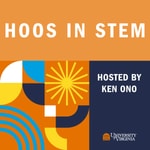Hoos in STEM – Details, episodes & analysis
Podcast details
Technical and general information from the podcast's RSS feed.

Hoos in STEM
STEM Advisor to the Provost at the University of Virginia
Frequency: 1 episode/21d. Total Eps: 45

Recent rankings
Latest chart positions across Apple Podcasts and Spotify rankings.
Apple Podcasts
🇨🇦 Canada - mathematics
14/08/2025#64🇬🇧 Great Britain - mathematics
14/08/2025#64🇺🇸 USA - mathematics
14/08/2025#47🇨🇦 Canada - mathematics
13/08/2025#64🇬🇧 Great Britain - mathematics
13/08/2025#64🇺🇸 USA - mathematics
13/08/2025#42🇨🇦 Canada - mathematics
12/08/2025#63🇬🇧 Great Britain - mathematics
12/08/2025#64🇺🇸 USA - mathematics
12/08/2025#38🇨🇦 Canada - mathematics
11/08/2025#61
Spotify
No recent rankings available
Shared links between episodes and podcasts
Links found in episode descriptions and other podcasts that share them.
See allRSS feed quality and score
Technical evaluation of the podcast's RSS feed quality and structure.
See allScore global : 53%
Publication history
Monthly episode publishing history over the past years.
VP for Research Lori McMahon is UVA's Chief Dreammaker
Season 2
vendredi 30 août 2024 • Duration 25:37
What's in a Data Science Degree?
Season 1
vendredi 12 juillet 2024 • Duration 35:26
UVA just opened the doors to the nation's first School of Data Science. The new school, funded by an extraordinary $120 million gift from Jaffray and Merrrill Woodriff and the Quantitative Foundation, will offer undergraduate, master's and doctorate degrees. On this episode of Hoos in STEM, Data Science professors, Prince Afriyie and Brian Wright, tell us all about the process of designing the curriculum for this industry-leading school, and what their first cohort of undergraduate students can expect when classes start in August.
Dean Melina Kibbe is Leading Scientific Breakthroughs at UVA's School of Medicine
Season 1
mercredi 13 décembre 2023 • Duration 30:57
Dr. Melina Kibbe is a vascular surgeon, Chief Health Affairs Officer, and the Dean of UVA's School of Medicine. In this episode, she sits down with host Ken Ono to discuss breakthrough technologies coming out of the School of Medicine, including the artificial pancreas and targeted nanofibers meant to prevent scarring. They also talk about her path into medicine and administration, advice for women getting into STEM, and the groundbreaking for the Paul and Dianne Manning Institute for Biotechnology--a game-changer for UVA and for the entire medical community.
UVA's Futures Initiative is Charting the Next Era of Higher Education
Season 1
mardi 5 décembre 2023 • Duration 25:13
How will institutions of higher learning respond to changes in the workforce as a result of AI? What role will universities play in the evolving era of big data and the Internet of Things? How can science and the humanities work together to shape the future, not just react to external challenges?
To answer those questions, the University of Virginia has launched its Futures Initiative to help plan for the next 10 years in higher education. The Initiative will draw together an interdisciplinary group of leaders from across the University to examine current drivers of change in academia and chart a path for the next 10 years--a complement to President Ryan's 2030 "Great and Good" Plan.
This episode is a conversation featuring the three leaders of UVA’s Futures Initiative--Ken Ono, STEM Advisor to the Provost; Christa Acampora, Dean of the College and Graduate School of Arts & Sciences; and Phil Bourne, founding Dean of the School of Data Science.
UVA's Physicists Are Studying Black Holes and Unraveling Ancient Paradoxes
Season 1
vendredi 3 novembre 2023 • Duration 34:26
What's the nature of matter and energy? What would cold fusion mean for our energy systems? What is quantum physics -- and why was Einstein mistaken about it?
These are just a few of the questions being asked by UVA's physicists, whose investigations of the universe collectively span from the smallest subatomic particles to the densest neutron stars. This week, Professor Ono is joined by theoretical physicists David Nichols and Marija Vucelja.
Dr. Nichols studies the nature of gravity itself--how gravitational waves bend spacetime at the speed of light and the sophisticated equipment required to measure those effects. Dr. Vucelja, an expert in non-equilibrium systems, describes her breakthroughs in studying the Mpemba Effect--a counterintuitive phenomenon where hot liquids actually freeze faster than cold ones. They also explain some hot topics in pop physics, like cold fusion energy generation and the powerful promises of quantum computing.
UVA's Brain Institute is Fighting Cognitive Decline and Mapping the Brain
Season 1
samedi 21 octobre 2023 • Duration 32:58
How does the brain develop, change, and decline over a lifetime? What can we do to fight conditions like Alzheimer's disease and epilepsy? Dr. Jaideep Kapur and Dr. Sarah Kucenas, Director and Co-Director of UVA's Brain Institute, are committed to answering these questions.
They discuss Dr. Kapur's work with epilepsy patients, Dr. Kucenas' use of zebrafish brain models, and UVA's $75-million investment into a Grand Challenge called Brain and Neuroscience--an interdisciplinary effort pulling together biologists, medical professionals, engineers, and data scientists to pioneer advances in neuroscience and map the workings of the brain.
Swimming with Data - UVA Data Points Podcast
Season 1
mercredi 4 octobre 2023 • Duration 47:20
In this episode of UVA's Data Points Podcast, guest host Professor Ken Ono is joined by three UVA swimmers who are pursuing graduate degrees in data science and statistics while also performing as student-athletes: August Lamb, Kate Douglass, and Will Tenpas. They discuss student life, balancing academics with swimming, and how data science and mathematics are helping them win championships--plus, the growth of data science at UVA and how it helps swimmers improve performance.
UVA's Link Lab is Building Solutions in Cyber-Physical Systems
Season 1
jeudi 14 septembre 2023 • Duration 34:12
How can engineers of vastly different disciplines work together to solve problems in the modern world? By putting them all in one place! This week's guests are Jonathan Goodall and Laura Barnes, the Director and Associate Director of UVA's Link Lab, an interdisciplinary space for faculty, undergraduates, and graduate students across engineering fields to brainstorm and build together. The combined expertise allows them to solve problems in "cyber-physical systems"--the interaction between software, hardware, and the environment, including everything from tracking health data to flood mitigation to building autonomous racecars.
Link Lab 2023 Research Day | University of Virginia School of Engineering and Applied Science
Polymath Dr. Bill Basener Uses Remote Sensing Data to Solve Large-Scale Problems
Season 1
mercredi 23 août 2023 • Duration 30:54
What do erosion, urban planning, food insecurity, disaster relief, and the hunt for lost cities have for common? Big data can help identify and solve those problems--that's the domain of our guest this week, UVA Professor Dr. Bill Basener. Dr Basener is a Professor at the School of Data Science and a genuine polymath, with publications in machine learning, signal processing, game theory, ecological economics, evolutionary genetics, and more. In this episode, he discusses how remote sensing techniques--long range images of the Earth taken by satellites and aircrafts--and how he and other scientists use that data to identify what's on the ground and how society can help.
Cosmic Time Travel with Dr. Bradley Johnson
Season 1
samedi 22 juillet 2023 • Duration 19:41
Wouldn’t it be magnificent if we could reach back in time to witness the beginning of the universe…back to the Big Bang? What would we see? What would we learn? Well, UVA’s Bradley Johnson, Associate Professor of Astronomy is doing just that! He’s a world expert on Cosmic Microwave Background, known as CMB. It’s the faint glow of the flash of light that burst from the early universe. Tune in to hear about his research and the technologies he's building to peek back over 13 billion years to the origins of the universe.